| | | | | | | Presented By ADT | | | | Axios World | | By Dave Lawler · Mar 20, 2023 | | Welcome back to Axios World. - In tonight's edition (1,852 words, 7 minutes), we travel to Moscow with Xi Jinping, observe protests in South Africa, look back on the Iraq invasion and then visit Finland to cheer up.
New arrival? Subscribe. | | | | | | 1 big thing: Two "dear friends" meet in Moscow | 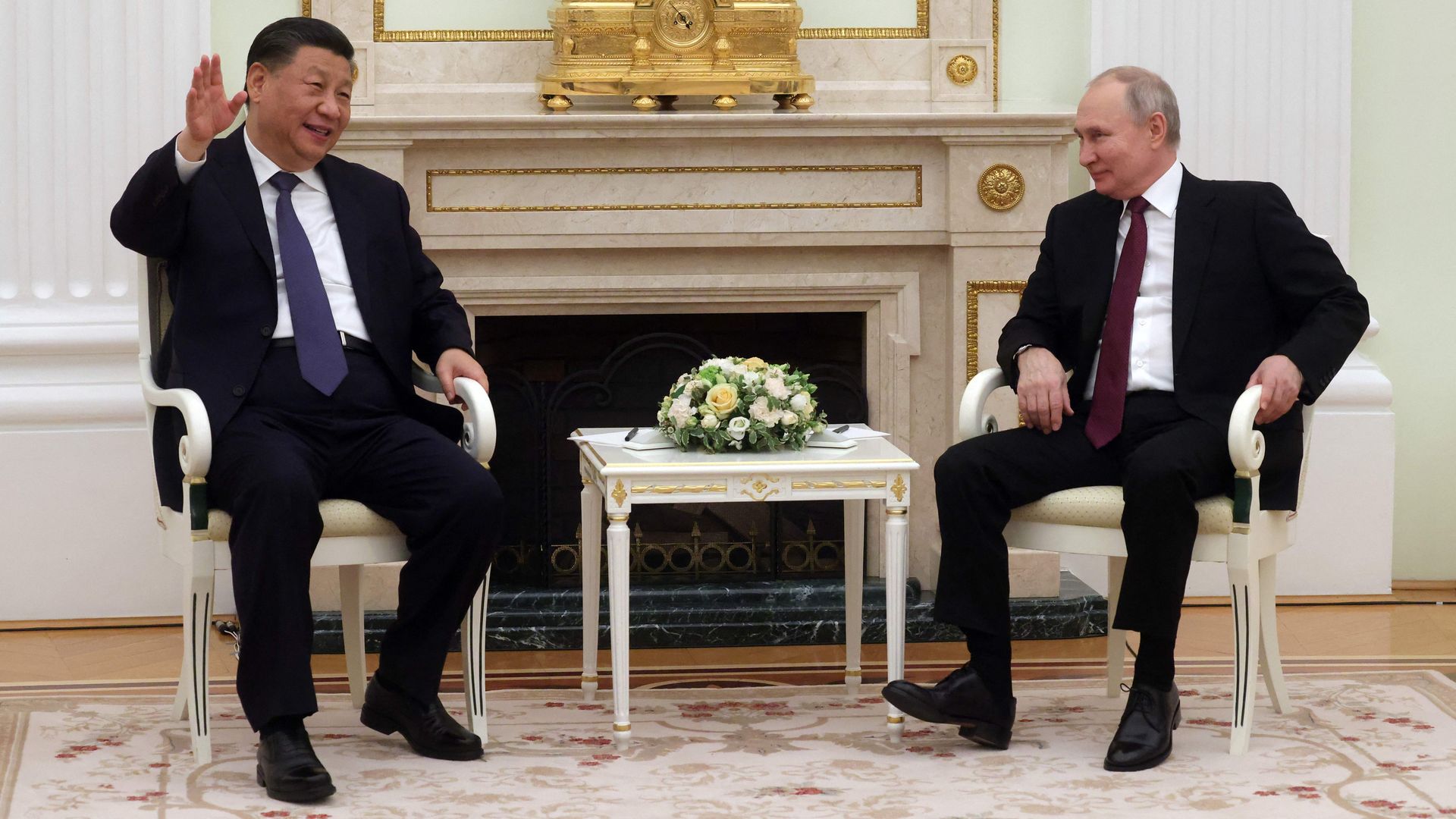 | | | Xi meets Putin at the Kremlin today. Photo: Sergei Karpukhin/Sputnik via Getty Images | | | | Chinese President Xi Jinping is signaling solidarity with his "dear friend" Vladimir Putin this week in Moscow — a visit that also underscores Russia's reliance on China to keep its economy and war machine running. Why it matters: China has helped shield Russia from Western efforts to isolate it following the invasion of Ukraine, significantly increased imports of Russian oil, and become an even more crucial source for Russia of key inputs like microchips. - The visit follows warnings from Washington that Xi might start backing the Russian war effort with weapons — claims Beijing denies.
Thus far, China has not openly breached Western sanctions or provided arms to Russia. In fact, Beijing is attempting to position itself as a mediator. - Putin said today that he looks forward to discussing Xi's recent peace proposal in detail.
- Putin also thanked Xi in an article published in Chinese state media for understanding the "true causes" of the conflict. Chinese officials and state media have echoed Putin's arguments that NATO is to blame.
- More recently, Beijing condemned the "double standards" at the International Criminal Court after it issued a warrant for Putin's arrest on Friday.
Between the lines: Xi's pseudo-neutrality can be summed up by his itinerary this week: a three-day state visit with Putin; a planned phone call with Ukrainian President Volodymyr Zelensky. - A European official recently told reporters in Washington that one potential "nightmare" scenario is that the military balance of the war shifts toward Russia, Western influence diminishes, and Chinese mediation starts to seem far more plausible.
The big picture: While Xi may consider Putin his "best friend," he has more practical reasons for aligning with Moscow. - Russia remains a key source of oil, arms and military technology for China. It's also an ideological ally for China in its rivalry with the U.S., with a seat on the UN Security Council, says Alexander Gabuev, an expert on the Russia-China relationship at the Carnegie Endowment.
- In an article of his own published today in the Russian press, Xi called for cooperation to confront "damaging acts of hegemony, domination and bullying."
- Chinese leaders often make Moscow the first trip of a new term, but Xi's decision to opt for a full state visit "is a statement that 'we will stand by Russia,'" Gabuev says.
Between the lines: Expect three days of handshakes, smiles, pomp and circumstance in Moscow, at least in public. Dinner tonight was a seven-course affair featuring quail blinis, Siberian salmon, venison in cherry sauce and wine from Russia's Black Sea coast, according to menus posted on Twitter. - But the balance of power between the neighbors has flipped since the Soviet era, particularly since the invasion. Trade with China now accounts for more than 30% of Russia's total imports and exports, but just 3% of China's. That gives Xi a lot of leverage with his giant neighbor.
- "Continuing the war for Putin is more important than any attempt to keep balance or strategic autonomy," Gabuev says. "Since the war is the organizing principle of Russian foreign policy now, whoever gives you the ability to continue is your best friend."
|     | | | | | | 2. Protests in 5 African countries | 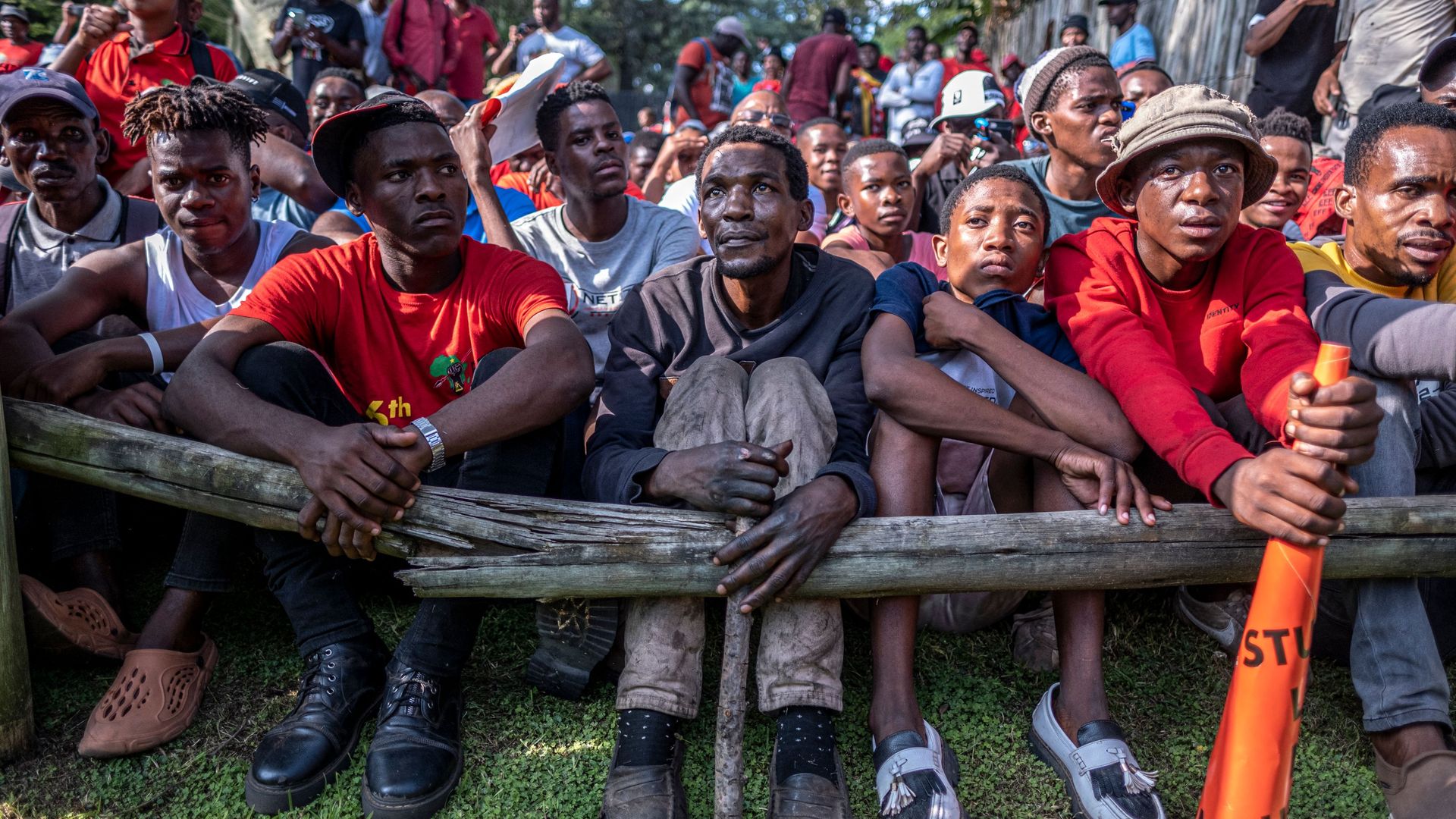 | | | Protesters gather outside the presidential guest house in Pretoria, South Africa, today. Photo: Emmanuel Croset/AFP via Getty Images | | | | South Africa's left-wing opposition Economic Freedom Fighters (EFF) party called on workers to stay home today and held marches in major cities to demand President Cyril Ramaphosa's resignation. Why it matters: The protests were sparked by rolling blackouts that last up to 10 hours per day and high unemployment. - Ramaphosa's ruling African National Congress (ANC) said the EFF's "national shutdown" tactics were "extremist and regressive." Eighty-seven people were arrested ahead of the protests.
- The ANC has governed South Africa since the first post-Apartheid election in 1994, but the party is in danger of losing its parliamentary majority for the first time next year.
- In other news from the country... "A South African accountant who was investigating high-level corruption cases has been shot dead along with his son," the BBC reports.
Meanwhile, in Kenya, opposition leader Raila Odinga today led the biggest protests since his rival William Ruto took office as president in September. - Kenyan police had denied permission for the protest. They fired tear gas at Odinga's convoy as it traveled through Nairobi, while some demonstrators hurled stones at police.
- Odinga claimed he defeated Ruto, but his electoral challenges were dismissed. He continues to claim the vote was "stolen" and has pledged to hold weekly protests, per the BBC.
Zoom out: - In Senegal, thousands rallied in support of opposition leader Ousmane Sonko last week, who faces charges for defamation and rape that his supporters say are politically motivated.
- In Nigeria, supporters of opposition candidates continue to challenge electoral results that saw president-elect Bola Tinubu declared the winner.
- In Tunisia, protesters rallied today against President Kais Saied's power grabs. Saied's supporters held counter-demonstrations.
|     | | | | | | 3. Global news roundup | 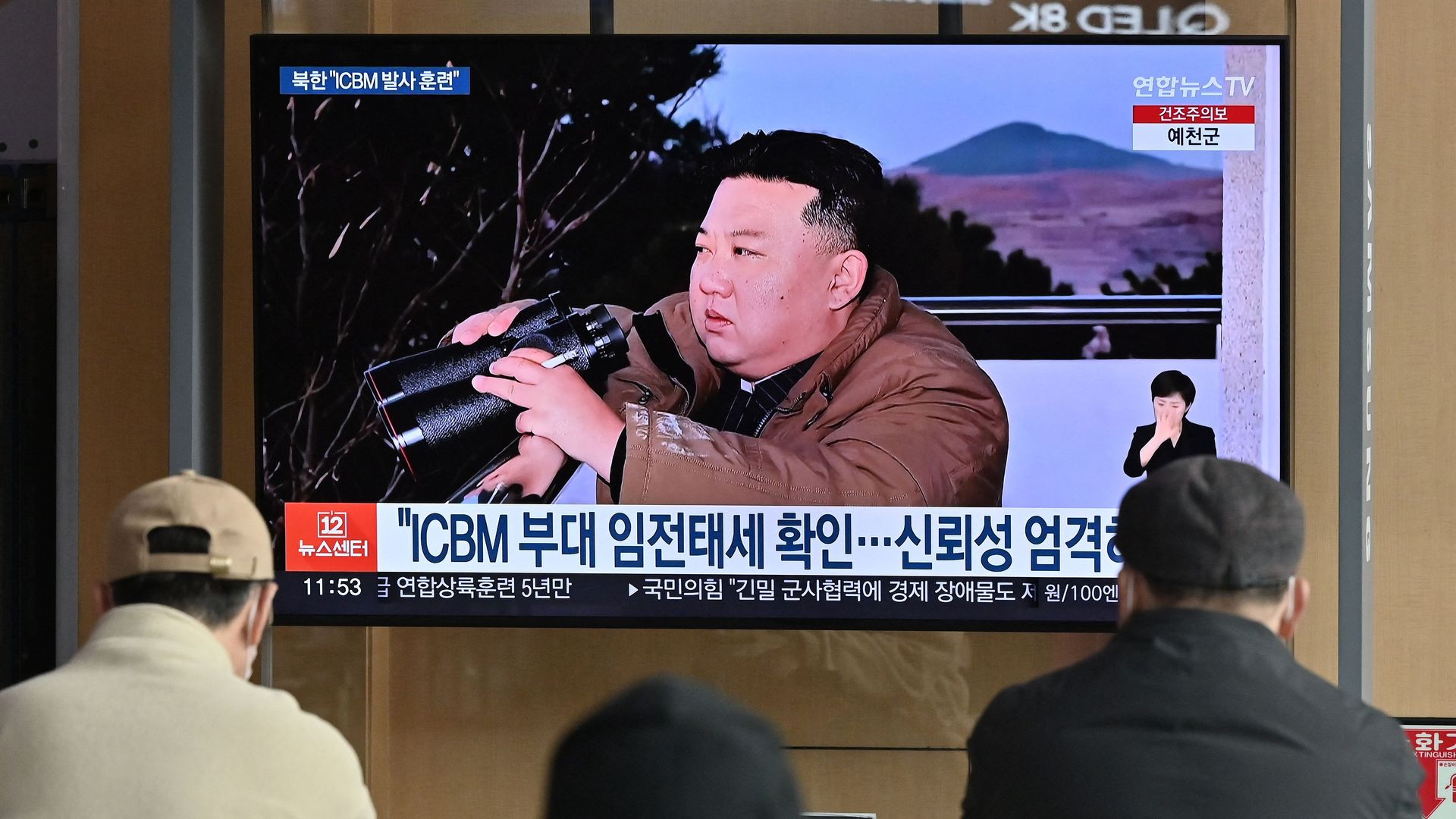 | | | Watching Kim watch a missile test, in the Seoul metro. Photo: Jung Yeon-Je/AFP via Getty Images | | | | 1. Kim Jong-un oversaw tactical drills "simulating a nuclear counterattack" over the weekend, North Korean state media said today. - North Korea appeared to use a buried missile silo in its latest test, per Reuters, which could make future launches harder to monitor.
2. French President Emmanuel Macron's government today narrowly survived a no-confidence vote which would have blocked his highly unpopular pension reforms that will raise the retirement age from 62 to 64. 3. An estimated 43,000 people, half of them children under the age of 5, died last year due to prolonged drought in Somalia, a report released today by the UN and Somali government estimates. Go deeper. 4. Serbia and Kosovo reached an "accord" on a path to improve relations after 12 hours of EU-mediated talks... but they didn't actually sign anything. 5. Thailand's parliament has been dissolved, meaning elections must take place in the next 60 days. - They'll pit the Pheu Thai party, led by the daughter of exiled former Prime Minister Thaksin Shinawatra, against Prime Minister Prayuth Chan-ocha.
- Pheu Thai is way ahead in the polls, but the conservative establishment has built-in advantages, and Thailand's military has a long history of coups (including one by Prayuth against the last Pheu Thai government in 2014).
6. Former Taiwan President Ma Ying-jeou will make a landmark visit to China next week — the first such trip by a former Taiwanese leader since the end of the Chinese civil war in 1949, Axios' Han Chen writes. - Split screen: Ma's trip to China will overlap with Taiwan President Tsai Ing-wen's stopover in the U.S., which is expected to include a meeting with House Speaker Kevin McCarthy. Ma is a senior member of the opposition Kuomintang party that is friendlier toward Beijing.
|     | | | | | | A message from ADT | | Stay a step ahead | | |  | | | | Life is unpredictable, but ADT can help you and your loved ones stay safe and secure. Here's how: An ADT security system offers a range of services, from video surveillance devices to carbon monoxide detectors. Learn how you can get a Google Nest Doorbell installed for free*. | | | | | | Bonus: Where in the World | 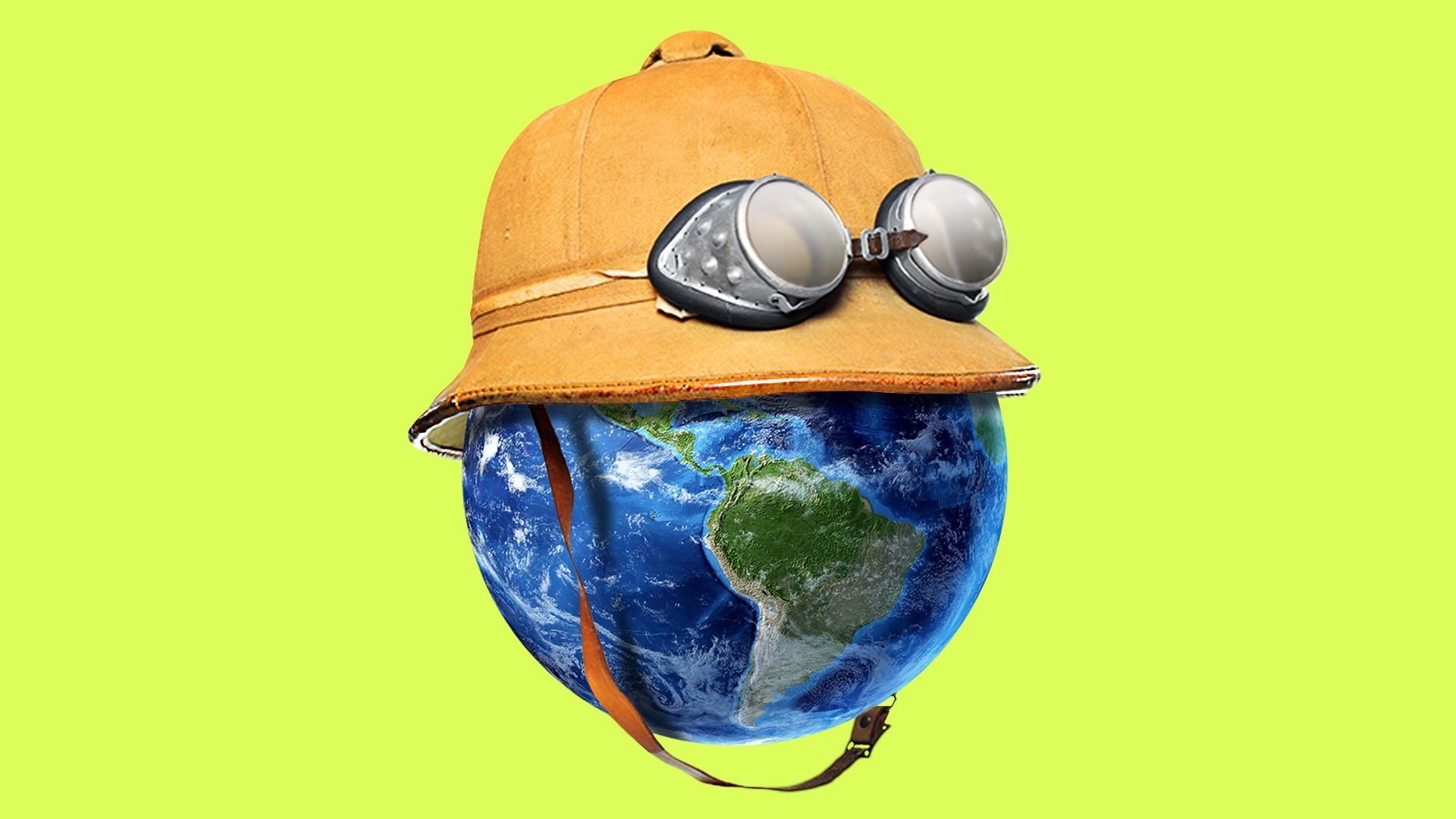 | | | Illustration: Natalie Peeples/Axios | | | | One reason the China-Russia relationship is so important to both countries is that they share the world's sixth-longest land border. Can you name the five that are longer? Some hints below: - China and Russia each share a longer border with one other country. Both of those countries are landlocked and sit between the two giants.
- North and South America are both represented.
- The last answer surprised me, perhaps because it's not a single, relatively straight border as in the other cases, but a larger country partially enveloping a smaller neighbor.
Scroll to the bottom for answers. |     | | | | | | 4. What Biden told Bibi on judicial reform |  | | | Anti-government protests on Saturday in Tel Aviv. Photo: Eyal Warshavsky/SOPA Images/LightRocket via Getty Images | | | | President Biden urged Israeli Prime Minister Benjamin Netanyahu to reach a compromise over his judicial reform plans — which have prompted massive protests, including within Israel's military — in their call on Sunday, Axios' Barak Ravid scoops. Behind the scenes: Biden said he was concerned because this is the highest level of domestic anxiety over politics he's ever seen in Israel. Netanyahu told Biden he's trying to solve the issue but needs time and space to do it, two U.S. sources tell Barak. - An estimated 120,000 protesters gathered Saturday in Tel Aviv alone.
- State of play: Netanyahu's office announced he would postpone votes on most aspects of the plan until after Passover (April 5-13), but plans to push ahead with a controversial proposal to give the government full control over the appointment of Supreme Court judges before then.
In related news... Jordan accused far-right Israeli Finance Minister Bezalel Smotrich of violating the peace agreement between the two countries after a speech he made in Paris. - Standing at a podium featuring a map that included Jordan and the occupied West Bank as part of Israel, Smotrich called the Palestinian people "an invention."
|     | | | | | | 5. How the Iraq War changed U.S. foreign policy | 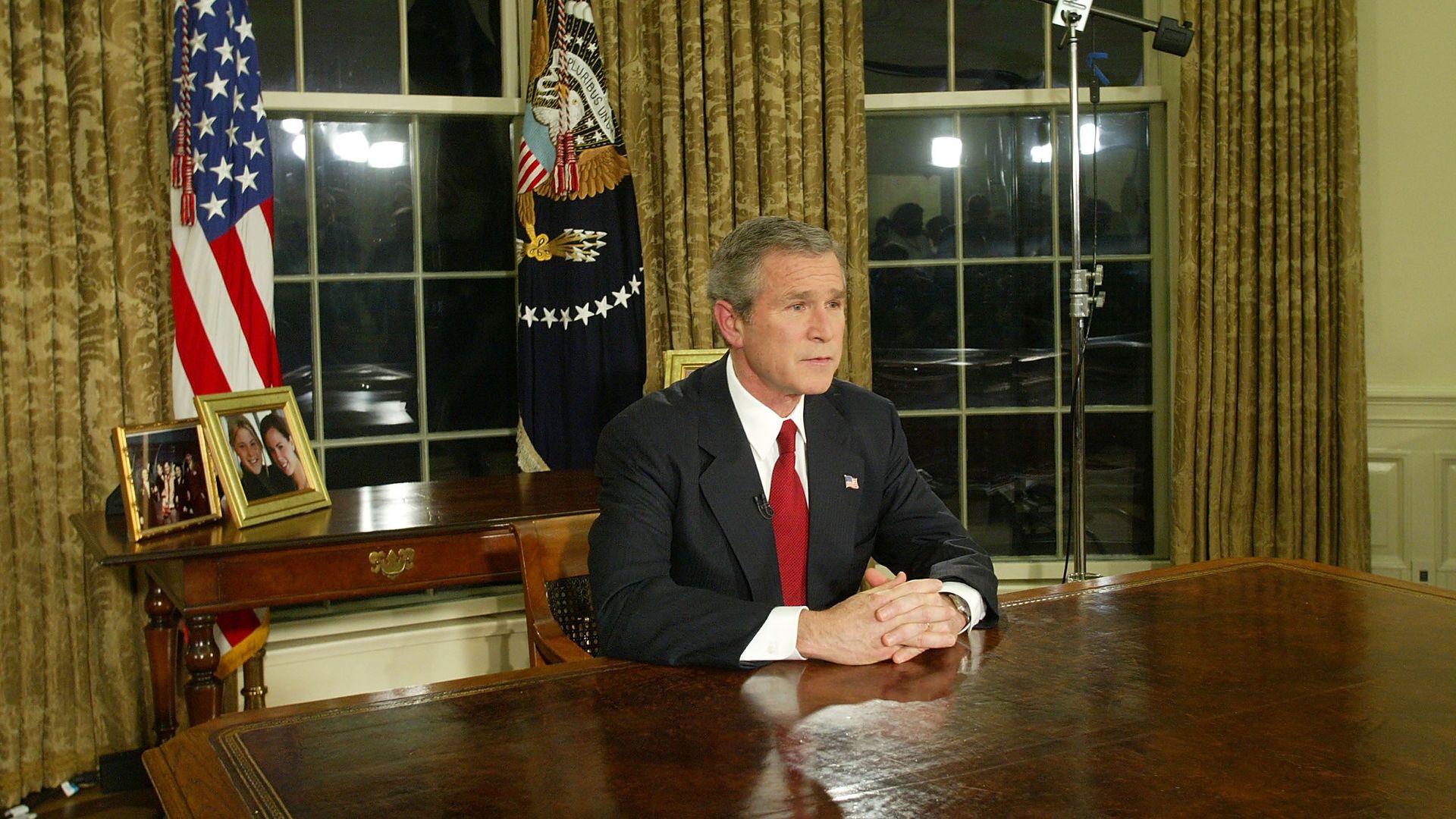 | | | President George W. Bush informs Americans in televised remarks on March 19, 2003, that the U.S.-led military intervention in Iraq had begun. Photo: Alex Wong/Getty Images | | | | Two decades after the U.S. invaded Iraq, 61% of Americans do not believe the U.S. made the right decision, according to an Axios/Ipsos poll. Why it matters: The chaos and destruction that followed the invasion have made a generation of Americans and their leaders more skeptical of the use of military force overseas, in particular in the Middle East. Flashback: The U.S.-led ground invasion began 20 years ago today, and was highly popular at the time. - A Pew poll in February 2003 found that 66% of Americans approved of military action in Iraq and only 26% disapproved.
- However, the Bush administration had justified the invasion on the grounds that Iraqi dictator Saddam Hussein possessed weapons of mass destruction, which were never found. Some 57% of Americans at the time also believed, falsely, that Saddam had played a role in the 9/11 attacks.
- By 2005, American public opinion had generally turned against the war. Around the world, and among European allies, in particular, attitudes toward the U.S. turned sharply negative in the years after the invasion.
Both Barack Obama and Donald Trump criticized the war repeatedly on the campaign trail, and once in office were generally more reluctant to put American "boots on the ground" in conflict zones than their immediate predecessors, Bush and Bill Clinton. - When Obama was considering a military response to the Syrian regime's use of chemical weapons in Syria, for example, "you felt the ghost of Iraq that whole week," Ben Rhodes, one of Obama's top foreign policy advisers, said this week.
Go deeper: |     | | | | | | 6. Who's happy now? |  | | | A winter's day in Helsinki. Photo: Jussi Nukari/Lehtikuva/AFP via Getty Images | | | | Finland has retained its crown as the world's happiest country, according to the UN's annual World Happiness Report. - Top 5: Finland (1); Denmark (2); Iceland (3); Israel (4); Netherlands (5).
- Bottom 5: Afghanistan (137); Lebanon (136); Sierre Leone (135); Zimbabwe (134); DRC (133).
- Other selected: U.S. (15), Brazil (49), China (64), Russia (70), India (126).
One big surprise: Happiness did not decrease globally over the last three years vs. the three prior years, according to the survey, despite that whole global pandemic thing. - People over age 60 actually saw a modest improvement in happiness during the pandemic.
- The authors speculate one big reason happiness did not decline is because of the additional time people spent caring for one another.
|     | | | | | | 7. Stories we're watching | 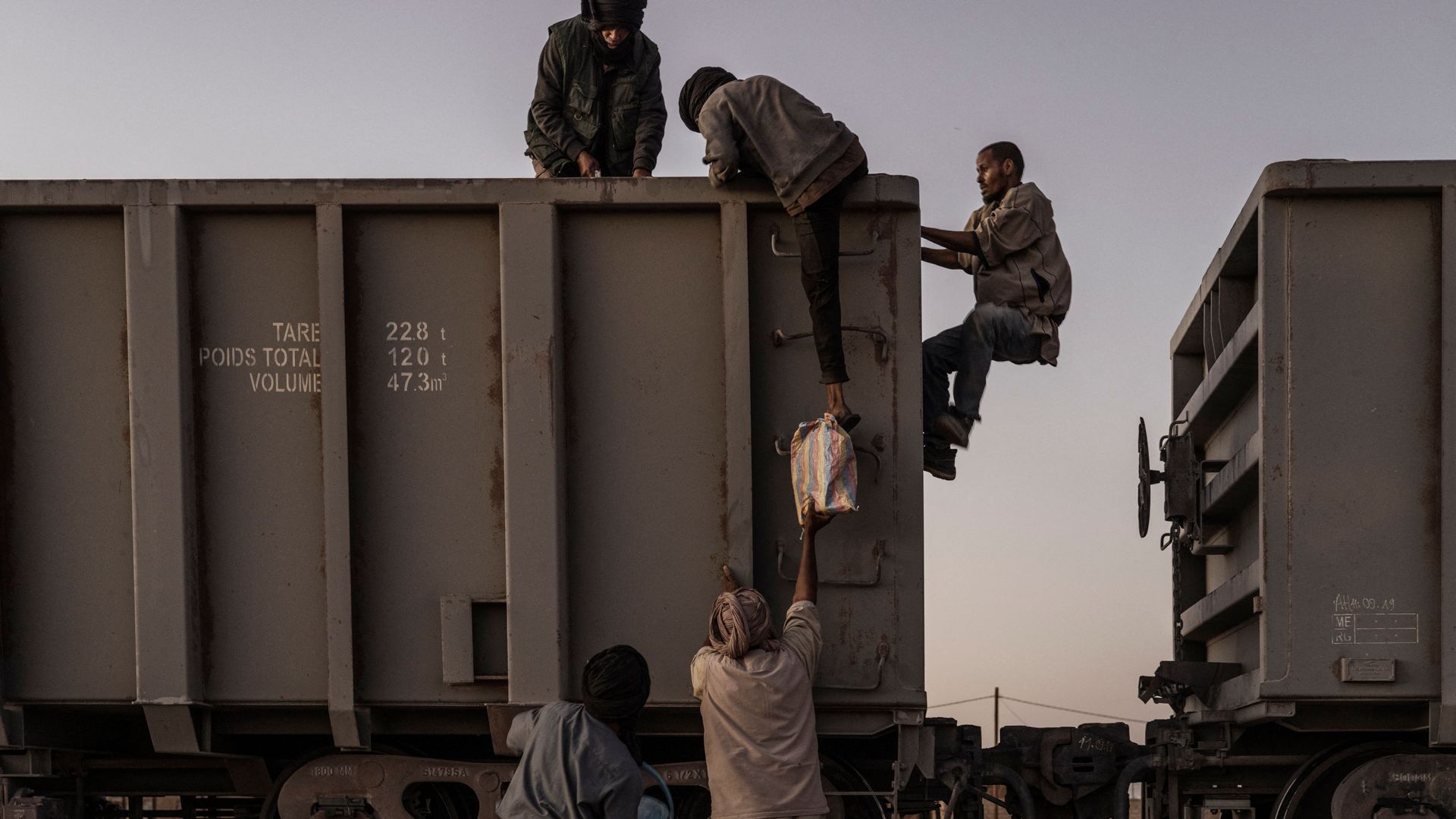 | | | Hitching a ride on an iron ore train to the coast in Zouérat, Mauritania. Photo: Marco Longari/AFP via Getty Images | | | - UN report: Window to limit global warming is closing
- Congress moves to repeal Iraq-era military force authorization
- TikTok CEO: App sale won't address U.S. concerns
- Turkey's Erdoğan backs Finland's bid to join NATO
- U.S. citizen kidnapped in Niger released after 6 years
- Global central banks take joint action to keep dollars flowing
- How this global financial crisis is different
Quoted: "My friend, if you think we're going to spend a billion dollars of our money over there, you are sadly mistaken." — Then-Defense Secretary Donald Rumsfeld just prior to the invasion of Iraq, per the NYT. The U.S. spent almost $2 trillion. |     | | | | | | A message from ADT | | When life comes knocking | | |  | | | | In an unpredictable world, an ADT security system can offer better peace of mind. The benefits: Choose from a range of smart devices and services that will help protect your home and control them all from the ADT mobile app. Knock, knock — Get a free* Google Nest Doorbell installation now. | | | | Answers: 1. Canada-U.S.; 2. Kazakhstan-Russia; 3. Argentina-Chile; 4. China-Mongolia; 5. India-Bangladesh. |  | | Are you a fan of this email format? Your essential communications — to staff, clients and other stakeholders — can have the same style. Axios HQ, a powerful platform, will help you do it. | | | | | | Axios thanks our partners for supporting our newsletters.
Sponsorship has no influence on editorial content. Axios, 3100 Clarendon Blvd, Arlington VA 22201 | | | You received this email because you signed up for newsletters from Axios.
To stop receiving this newsletter, unsubscribe or manage your email preferences. | | | Was this email forwarded to you?
Sign up now to get Axios in your inbox. | | | | Follow Axios on social media:    | | | | | |













No comments:
Post a Comment